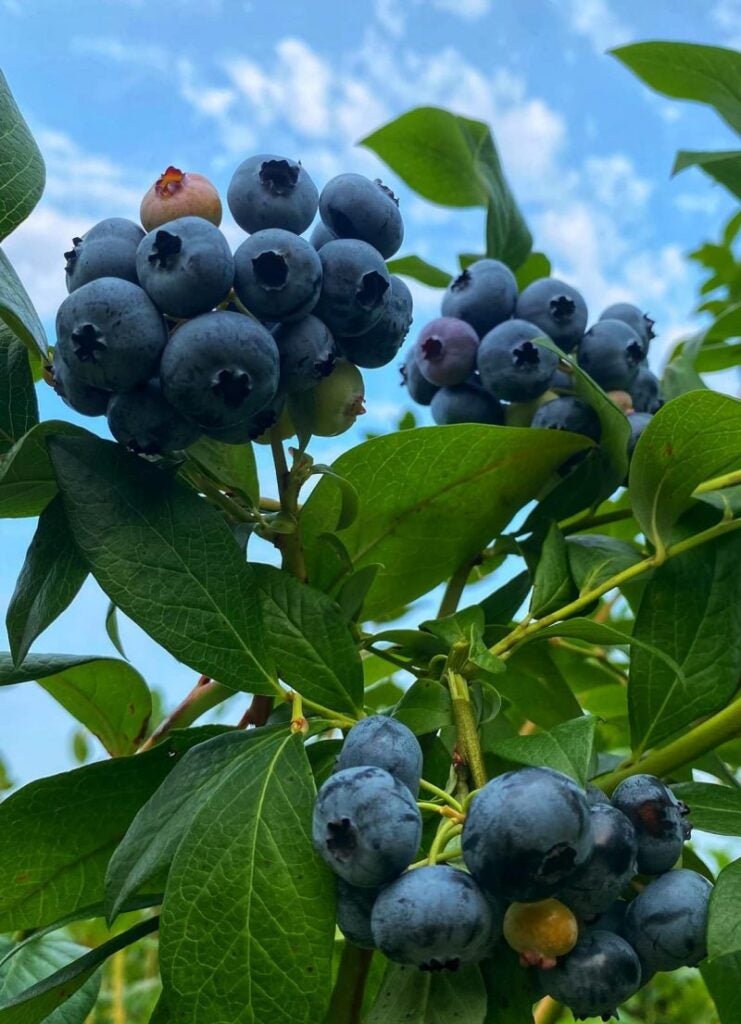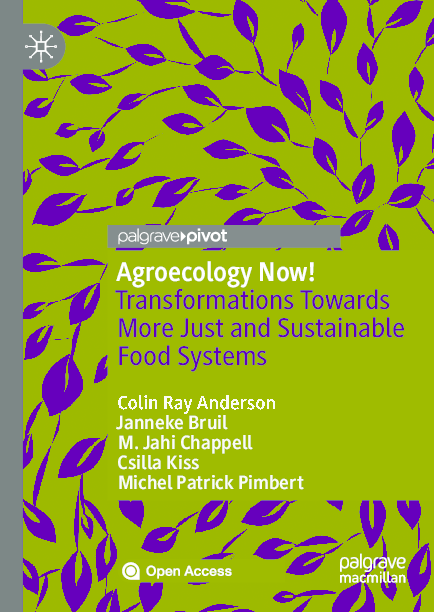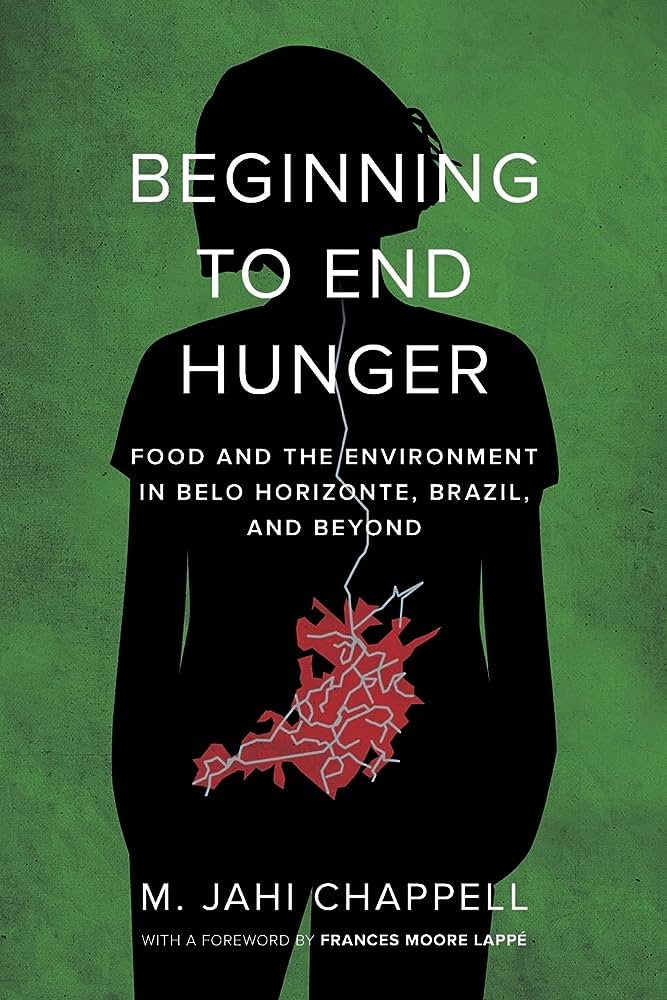
What is your current position?
I am the Director for the Center for Regional Food Systems (CRFS) at Michigan State University where I’m also the WK Kellogg Foundation Endowed Chair in Food, Society and Sustainability. I’m also a professor in the Department of Community Sustainability, the department that houses CRFS.
What courses do you normally teach?
I’ve been here only about eight or nine months and a lot of my time focuses on CFRS. I will be teaching one or two classes a year and I might add onto our food justice courses, food and environment courses that we have here; agroecology, or social aspects of agroecology as those are things I’ve taught in the past.
What did you study at University of Michigan?
I have my Bachelor’s degree in Chemical Engineering and a Ph.D. in Ecology and Evolutionary Biology (EEB). I did my PhD with John Vandermeer in EEB.
Your grandparents were farmers in Michigan, what did they grow and how was their experience?

My mom’s parents owned a blueberry farm in South Haven, Michigan. That area has become very tourist-driven but back in the day it was a lot quieter, even as it was an open secret in Michigan of how lovely it was there. My grandparents had chickens, a couple of cows, they grew most of their own vegetables, and had a lot of fruits other than blueberries. Selling blueberries is what made money but it was a diversified farming operation. The really interesting thing about it is my grandpa bought the farm (with I believe money from an inheritance from my grandma’s family) because he wanted to be able to provide food for his own family no matter what happened in the economy. He did have a factory job, but he was practicing Black food sovereignty before we had that term. He encouraged other Black people to also farm. There was a friend of his named Mr. Jones that actually did take up farming. He was a high school science teacher and my grandpa encouraged him to be a farmer, and he’s still doing it, even though he talks about how hard it is and that he believes there won’t be many farmers left soon.
Do you have blueberry recipes your family passed down from your grandparents?
The recipes have varied over the years. You can put blueberries in everything! We used to have blueberry cobbler, that’s my favorite. At one point more recently, I bought blueberries at a grocery store, and they had been around for a bit. So I boiled them down to a reduction and I was met with “why are you doing that, those are expensive!” But I was just used to having pounds of blueberries in the fridge. You make some into a reduction, you freeze some, you have some fresh, I’m still used to the idea that you’ve got pounds and pounds of them every summer.
You have two books; have you always pictured yourself as an author?
It’s not something I ever pictured. I’ve always been good at writing. It was one of my stronger subjects in school. I had an English teacher who was surprised I was going into science! I actually find writing academically extremely hard because you have to be practically, carefully “defensive” in your writing rather than expressive. I have worked in non-profits as well as academic institutions and I have to say I enjoyed non-profit writing much more because you can focus more on the aesthetics. You still want to be accurate but don’t have to sort of preemptively defend everything. I read one Oxford Press blog that was talking about what they called “fortress writing” where you have to defend yourself against any possible attack. That’s not how we talk and it’s tedious to read, even if it’s required.
Every once and a while I think about writing fantasy or sci-fi which I used to read a lot of. It never occurred to me to write a nonfiction book before grad school. When I finished my dissertation my committee encouraged me to think about a book.
How did the books come to be?
There was the story of the city I was researching, Belo Horizonte, I kept mentioning it, and people were asking where they could read more about it. After having put down the idea of a book for some years, I finally thought “I should write it.” I originally came across Belo Horizonte’s pioneering food programs during Ivette Perfecto’s class called “Our Common Future.” There were lots of examples of things that have gone wrong due to American Imperialism, the exploitations of Capitalism, but also promising alternatives where people have innovated and pushed the envelope, and Belo Horizonte was mentioned. From Ivette and then Catherine Badgley, I looked into the city more and got connected with Cecilia Rocha. Cecilia is a Brazilian-Canadian nutrition economist at Ryerson University who researched Belo Horizonte for years. She connected me and based on her mentorship I was able to do my research there.
Read more
My second book, Agroecology Now!, was co-written with my colleagues Colin Anderson, Janneke Bruil, Csilla Kiss, and Michel Pimbert. At one point, I left academia to go to non-profit [work], and following that I went back to academia in England at the Center for Agroecology, Water and Resilience at Coventry University. It’s a unique center for agroecology in the world. It is focused in agroecology as an orienting approach from both a social and natural science side. We did several projects together, including one for the FAO [where they were] asking about the state of agroecology and how we can understand what’s happening in the world and how to transition to more sustainable and just food systems. From thinking through the literature we were looking at in terms of agroecological transition, we wrote a paper, and then a book based on that. As a team, we focused the book on six enabling factors and six disabling factors for an agroecological transition. We looked at what makes it more likely and less likely, [using] a framework called multi-level perspective which starts connecting how you can think of changes that may appear to be just in one place. People might say this is one example, and question how that can lead to large scale change. It’s not automatic, of course, but the multi-level perspective talks about how, as you build out and protect such “niches” of alternatives, those can start bubbling up, connecting, cross-reinforcing, and eventually themselves become what’s common. This is how “niches” can actually change the whole regime. So we talked about what would enable that bubbling up and consolidation, or what would allow that scaling out to happen.
It’s always important to note that food systems are incredibly variable around the world and even variable within a community, and within different social classes and races within the community.
People I’ve worked with, such as members of the Detroit Black Community Food Security Network, and others such as Karen Washington (based in New York) have rejected the term “food desert” for a variety of reasons, and have named the situation instead as “food apartheid.” I was just on a panel where Craig Gunderson, a noted researcher on hunger, was pointing out that even if you control for economic factors like income, that there is still an effect of race on access to food and hunger in the United States. That’s why a number of people call it food apartheid. There is a race and class component to access to food, and that’s more important than the geographic location, more important than “as the crow flies” distance to a supermarket.
Do you have any advice for UM students interested in food systems careers?
What we talk about a lot in agroecology is diversity, and I think right now one of the strongest things you can do in food systems is to cultivate a diversity of knowledge and experiences. Students can lean into that diversity in terms of classes and opportunities. There are student groups with opportunities across campus, including the Campus Farm run by Jeremy Moghtader (who I went to grad school with). For me, being on the board of Ypsilanti-based nonprofit Growing Hope while I was working internationally gave me a local connection to the food system. I think having that local connection to a community is really important. More and more students are doing and not just taking the classes but connecting with people in the field. But I think one real key element is doing it with humility and service in mind.
Read more
For example, at a food sovereignty symposium at U of M about eight years ago, there was an interesting point from Malik Yakini from Detroit Black Community Food Security Network. Students asked how they could help, and he said to “come help us pull weeds.” Some students were really annoyed and said that they wanted a chance to contribute and be listened to. It was fascinating because I felt it was a very entitled question of “when do we get to have a voice”? They have a voice! You can say whatever you want at any point. What they were really asking about is “when are people going to use [my] ideas.” But you have no right for people to use your ideas. You can say what you want, but others don’t have any obligation to listen or do what you say–particularly if you’re coming from outside of their community.
If you want someone in Detroit to use your ideas and you’re from somewhere else, you earn that by being a part of the community, not by being booksmart. Even if you have farming experience, you still need to know what’s happening where you’re trying to help, and have the respect for people there. That comes from helping from the position of a helper and not from trying to lead when you’re not from that community. You can go so far by going and listening to communities and contributing to whatever they might ask for. If that’s weeding, then do some weeding! That’s how you build respect–by helping people, rather than what I call “helping at them.” Listen to what they’ve actually asked for and see what you can do to support that and not try to turn it into something else. If you really want to help, you need to listen and support the way people ask to be supported. You have to be careful you’re not using that superficially to say you were involved in the community, so now you should hire me because I’m the expert on community. But if you do it right, it really is giving you a real insight and set of skills that not everyone has, if you genuinely do that deep work in community.
Which authors, articles or documentaries had a significant impact on you?
John Vandemeer, Ivette Perfecto, Catherine Badgley, and the late Jerry Smith, were all really important and opened my mind in ways I hadn’t realized were possible. It was with Jerry that I read a book of essays called Getting Down to Earth: Practical Applications of Ecological Economics, even though Jerry was a fish paleontologist. Jerry and Catherine had a farm together and Jerry was a very astute listener and thinker. Even though he never really published research on the social side, he read extensively, and he came across Getting Down to Earth and several essays in it.
Read more
Several essays particularly captivated me — “Envisioning a sustainable world”, “Collapse of complex societies”, Bob Costanza and colleagues talking about “valuing ecosystem services”… Tom Prugh, Herman Daly and Bob Costanza wrote a book expanding on some of the same themes, The Local Politics of Global Sustainability, which I used to make all my students read.
To me there are two really important features of that book. One being that strong local governance is a necessary but not sufficient requirement for sustainability. They really make that argument well. Deep democracy and strong local governance is necessary, you can’t get to sustainability without those. The book also goes into what deep democracy looks like and why it is actually possible. We sometimes treat American democracy as the pinnacle, as if there’s nothing more to learn or nothing new possible. I think deep democracy, participatory democracy, these terms are rising ideas that they pointed to two decades ago that really formed the root of how I approach my work. The last person I would mention is Elinor Ostrom, who was also a huge influence on me. I was exposed to her work through Arun Agrawal at U of M in one of his first classes when he came to Michigan. Elinor Ostrom’s work on how people actually can collaborate to govern resources sustainably–it really challenges, refines, and partially refutes Garrett Hardin’s “Tragedy of the Commons”–and it was a really important example of scholarship for me, in terms of ambition, methodology, interdisciplinarity, and hope based solidly in empirical evidence and theory.
Interviewer: Kimmy VanDeWege, SFSI Coordinator
July 26th, 2023




